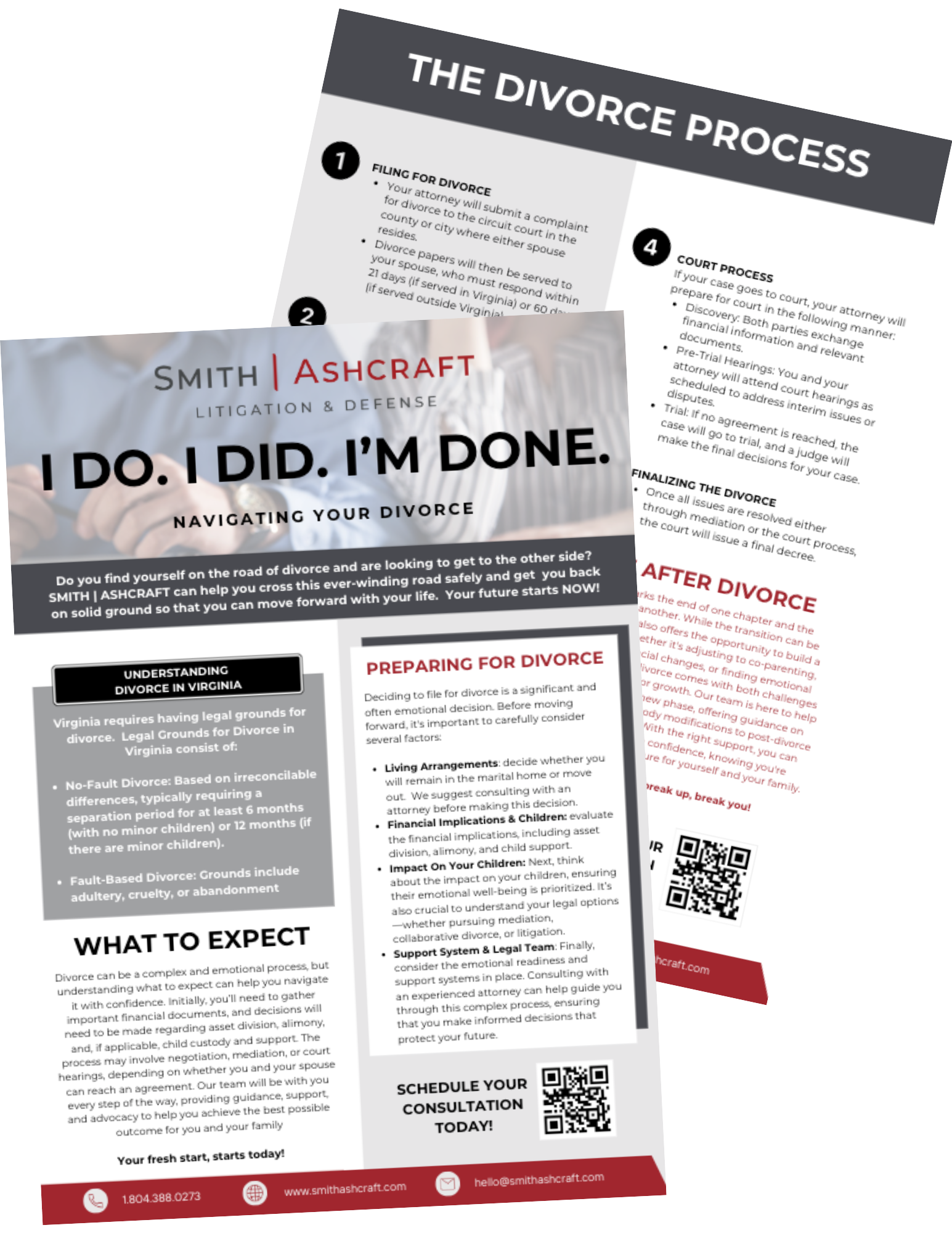Property Division
If you are going through a divorce, let SMITH | ASHCRAFT ensure your property division is fair in your divorce. Click "Get Started" or fill out our quick form below and our team will reach out to you to discuss your legal matters and how we can tailor a strategy specific to your needs.
Understanding Property Division
One of the most complicated issues in divorce is the division of property. This includes the division of debt as well. Lawyers and judges call this equitable distribution. This means that property and debts are not necessarily divided equally. Rather, it will be done “equitably.”
Central Virginia Courts have to follow a specific procedure in dividing property and debt:
- Identify all property owned by both spouses;
- Identify who owns it (what name is on the title);
- Determine the value of each item of property or amount owed on each debt;
- Determine whether the property or debt is separate, marital, or a hybrid of separate and marital property; and
- Consider the 11 statutory factors under Virginia law
Having the Court make this determination can be quite expensive. Most people going through divorce sign a settlement agreement that divides their property and debts. There are a lot of nuances to dividing property and debts and negotiating or arguing for the best outcome possible. Before signing any proposed agreement, it is imperative that you consult with a qualified attorney to help you avoid regret in the future and tailor the agreement to your best interests.
Classification of Property
In Virginia, a Court is tasked with classifying property and debts as either separate, marital, or hybrid (mix of separate and marital).
Separate property is property acquired before the date of marriage, property acquired during the marriage (gift from a person not your spouse, inheritance, and certain legal settlements), and property that is subject to a prenuptial agreement or post-nuptial agreement.
Marital Property is all property and income acquired from the date of marriage until the date of separation. It does not matter if this property is titled only in the name of one of the parties, so long as it was acquired during the marriage. Any separate property that was combined or commingled with marital property will also be considered marital unless one party can trace it back to being separate.
Hybrid Property is also called part-separate and part-marital property. This is most commonly found when one party owned a house before marriage, but lived in the house during the marriage. Retirement accounts are often hybrid property as well.
This type of classification also applies to debts. For both property and debts, the date of separation is extremely important as it has a direct impact on how property and debt is valued. Consulting with an experienced attorney like those at Smith Ashcraft is important to ensure that your property and debts are properly classified and awarded to either party.
Factors Considered
Virginia Courts are required to consider 11 factors in determining the equitable distribution (fair division, not necessarily equal) of property and debts. The official list of factors can be found here.
Below are some, but not all, of the factors the Court will consider:
- Monetary contributions to the family and acquiring property (who earned and/or paid for things during the marriage);
- Non-monetary contributions to the family and acquiring property (who cooked, who cleaned, who did yard work, who managed kids’ schedules, etc…)
- How the long marriage lasted;
- How and when property was acquired and whether it was titled in one person’s name;
- The age and physical/mental condition of the parties; and
- The reason for the breakdown of the marriage.
Judges are able to give however much weight to any of the factors in making a decision about dividing property and debt. Having an attorney help you persuade a judge to focus on the factors helpful to you is invaluable.
Valuation of Property
Putting a value on your property is an important part of your case. Whether you sign a settlement agreement or go to trial, it is important to understand a few things about valuing property in divorce:
- The Court is required to determine the value of property as of the date of trial. If you believe a different valuation date ought to be used, consult with an attorney to evaluate and analyze the facts of your case.
- Real estate is usually valued by obtaining an appraisal. This is what Courts prefer. However, comparative market analyses or even websites like Zillow or Redfin can be helpful in negotiating a settlement agreement without the cost of an appraisal.
- For vehicles (cars, boats, trailers, etc…) we use tools like NADA Guides and Kelly Blue Book to determine their value. Courts will accept these valuations as evidence as well.
For all non-retirement accounts, such as checking, savings, money market, and brokerage accounts, the regular monthly or quarterly statements are used to prove their value.
When dividing retirement accounts like 401(k)s, IRA, pension, or other defined contribution and defined benefit plans, it is important we receive in-depth information since these can often become hybrid property. If possible, providing statements from the date of marriage, date of separation, and the date of trial are extremely helpful. Since some of these benefits may have different vesting periods or may not pay out for many years, there may need to be more sophisticated calculations used to determine their value. If you think this applies to you, please consult with Smith Ashcraft to understand how a divorce will impact your retirement accounts.
If you own a business, please consult with an attorney as there is even more to consider when valuing and dividing the value of a business. This requires expert witness valuations and testimony if it has to go to court.
All other personal property such as furniture, collections, precious metals, jewelry, and artwork can be valued as the parties agree or may require an appraisal.
Real Estate
The marital home is typically one of the most valuable and contested issues in divorce. If you are questioning whether you should move out of your house, be aware that this decision can have a significant impact on your case. Moving out of the marital home can negatively impact the custody and visitation schedule you have with your children. It can also potentially be seen as abandonment and give your spouse grounds to file for divorce. If you want to keep the house after the divorce, moving out may prevent that from happening. Before moving out of your house, consult with Smith Ashcraft so that you can receive tailored advice based on your specific set of circumstances.
During the process of divorce, it is possible to obtain exclusive use and possession of a marital residence. This means that you can ask the Court to give you the house on a temporary basis and keep your spouse out of the home until the divorce is over. The Court can also order one or both parties to pay the mortgage and utilities while the divorce is pending.
The final disposition of your home will be left up to a judge unless you reach an agreement with your spouse. If the house or other real estate is titled solely in your name, the judge cannot give it to your spouse. If the real estate is titled in both names, the judge can then order it be sold or awarded to one of you. If you are awarded the home, you will also be responsible for the mortgage. This may require a refinance and buyout of your spouse’s equity in the house. Keeping your house can have significant financial impacts. Consult with an attorney to discuss how the different possible results may impact you financially going forward.
Retirement Accounts (Pension/401K)
Retirement accounts are a major asset that needs to be divided during the divorce process. Such accounts are often a complicated aspect of any divorce as they are almost always going to be classified as hybrid property.
There are two types of retirement accounts - defined contribution plans and defined benefit plans. Defined contribution plans include 401(k)s and IRAs. Defined benefit plans include pensions, Virginia Retirement System pensions, and military pensions.
Regarding both types of retirement accounts, your attorney will need to know how much had been contributed before marriage, during the marriage, and after separation. Virginia law considers the increase in value of a retirement account from the date of marriage to the date of separation as marital. Any contributions before the date of marriage or after the date of separation will be considered separate.
Since these retirement accounts are only going to be in one spouse’s name and carry tax consequences if cashed out, the law treats them differently from other assets.
If a defined contribution plan, like a 401k, is going to be divided, we use what is called a Qualified Domestic Relations Order or QDRO. This is a court order that creates a new account for the other spouse without triggering any tax consequences. The wording of these orders is very important, so it is vital to have an attorney familiar with QDROs and retirement benefits prepare these orders. When dividing IRAs, QDROs aren’t needed and a division can usually be done by filling out a few forms.
If you or your spouse have a pension, we can divide that by preparing a QDRO as well. However, these QDROs ultimately go on file with the employer providing the pension until the benefit starts to pay out. Pensions are usually divided by using a formula that calculates a percentage that the non-employee spouse will receive. This is based on the total number of overlapping months of marriage and employment versus the total number of months of employment.
If you or your spouse has a retirement account, be sure to contact Smith Ashcraft to discuss the account and what the options are for dividing it.
Debts
Debts, like property/assets, need to be divided in divorce. Like property, if only one person is listed on the debt, that person will ultimately be responsible to pay that debt(this does not mean the court will not order an offset from another asset or order a payment from one spouse to the other to fulfill their marital share). If both spouses are on the debt, then the Court can order either one or both to pay it.
If a debt is associated with an asset (mortgage for house or car loan for car) it will go along with the asset. The total equity in an asset will be the value of the asset minus any debt owed on it. Determining accurate equity values is imperative when attempting to reach a fair division of property and debt.
One major difference in valuing debt is that the Court looks at the date of separation rather than the date of the trial. This is because an overwhelming majority of debt incurred after the date of separation will be considered separate rather than marital debt.
Be aware that debt can also be handled through a bankruptcy. If you are considering bankruptcy, please consult with a bankruptcy attorney. If you file bankruptcy during your divorce or at the same time, please be aware that it can delay your divorce since the Bankruptcy Court will take priority over the divorce court. If you are doing both a bankruptcy and a divorce, make sure your bankruptcy attorney and divorce attorney are in communication so that both matters can move forward appropriately.
Marital Waste
Marital waste is the use of marital funds or property in a way that benefits one spouse and harms the other. This often takes the form of gambling, substance abuse, excessive spending without the knowledge or consent of the other spouse, or spending while having an affair. This can impact the Court’s division of property and debt in divorce by awarding the non-wasting spouse more equity in an asset or even monetary awards.
Property division is one of the most significant aspects of a divorce. Ensuring a fair distribution requires a clear understanding of marital and separate property laws.
At SMITH |ASHCRAFT, we’re committed to protecting your financial future. Our experienced attorneys will work diligently to identify, value, and divide assets equitably, whether through negotiation or litigation. We understand the stakes and are here to help you achieve a resolution that reflects your best interests.
Contact us today to discuss your property division concerns and how we can assist.
Everything You Need to Understand to
Better Navigate Your Divorce
At SMITH | ASHCRAFT we are here to get you through this chapter of your life.
Your future starts NOW!
Grounds for Divorce
In Virginia, grounds for divorce or separation can be categorized into two main types: fault and no-fault grounds.
Learn more about what type of divorce would best represent your situation.
Separation
In Virginia, there is no “legal separation” like other states have. When we talk about separation, we are talking about when one spouse intended to no longer be married. Learn more about the important points you should consider in a seperation.
Spousal Support
Because divorce creates two households, each with its own set of expenses, there is often a need for one spouse to receive spousal support, sometimes called alimony. The primary reason for a court to award spousal support is to help ensure that both parties continue to live a similar standard of living to the standard they enjoyed during the marriage. Learn more about the factors that contribute to determining spousal support and how this may impact your case.
Military Divorce
First of all, thank you to our military servicemembers and their families for the many sacrifices your service includes.
Military service comes with additional, special considerations in a divorce matter. There are federal statutes and rules that take priority over the normal state laws governing divorce.
Learn more about the special considerations taken when it comes to a military divorce.
Name Change
An adult may legally change his or her name in Virginia. This can be done as part of a divorce or in a separate filing.
Learn more about name changes and how we can help you in this process.
Prenuptial and Postnuptial Agreements
Prenuptial and postnuptial agreements directly impact your rights and obligations in the event of a divorce. Learn more about the complexity of these agreements and how they impact your case.
Helpful Articles
What Our Clients Have To Say
There's no where in Virginia that we don’t know
At SMITH | ASHCRAFT, we are proud to offer comprehensive legal services throughout Virginia. Whether you’re in Richmond, Northern Virginia, the far reaches of Roanoke, or any other part of the state, our experienced team is here to provide experienced representation tailored to your unique needs. No matter where you are in Virginia, we’re committed to delivering the same high level of service and dedication to each client, ensuring your case receives the attention it deserves.









